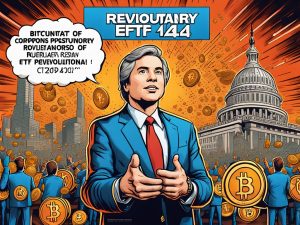Bitcoin Futures ETF and Market Manipulation Allegations
The cryptocurrency space often presents itself as a defender of decentralization, but historical data suggests otherwise. In December 2017, the first Bitcoin futures ETF was launched on Wall Street, aiming to bridge the gap between traditional finance and the crypto market. However, the aftermath was far from what experts had anticipated.
A tweet from Whalewire highlights the consequences of this launch, showing a significant downtrend in Bitcoin’s price. Many accuse Wall Street of manipulating prices through the futures market, triggering a prolonged bear market. This event has fostered mistrust among crypto enthusiasts towards mainstream financial institutions.
Susceptibility to Manipulation Tactics
Differentiating between spot ETFs and futures ETFs is crucial. Spot ETFs directly hold Bitcoin and mirror real-time price fluctuations, while futures ETFs involve contracts predicting future Bitcoin prices and may incorporate leverage and contract expiration.
The tweet and accompanying graph suggest that spot markets are vulnerable to manipulation tactics such as spoofing and wash trading. These deceptive practices distort supply and demand, leading to distorted price perceptions.
The Question of Decentralization vs. Traditional Finance
Given this historical perspective, the crypto community remains cautious about traditional financial entities introducing new financial products. The question arises: Can decentralization withstand the strategies of experienced financial players?
The story of Bitcoin’s price in relation to Wall Street’s involvement serves as a cautionary tale, revealing power dynamics, market psychology, and the ongoing battle between decentralization and established financial structures.
Hot Take: The Impact of Wall Street on Bitcoin’s Journey
The launch of the first Bitcoin futures ETF by Wall Street in December 2017 had a significant impact on Bitcoin’s price trajectory. Historical data suggests that the introduction of this financial instrument led to market manipulation and a prolonged bear market. This event has fueled skepticism among crypto enthusiasts towards mainstream financial institutions.
Spot markets, susceptible to manipulation tactics like spoofing and wash trading, further highlight the challenges faced by the crypto community. The question remains whether decentralization can withstand the strategies of established financial players. This narrative sheds light on power dynamics, market psychology, and the ongoing struggle between decentralization and traditional finance.





 By
By
 By
By
 By
By
 By
By
 By
By
 By
By